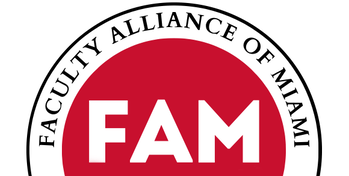In this unprecedented crisis, every university in this country will be making painful budgetary decisions. Hard discussions about how to survive and thrive during and after the crisis—examples of generatively difficult shared governance—are underway at many other universities. At Miami, not so, yet.
Shared governance is the meaningful participation by faculty in decisions that affect the academic mission. AAUP has been offering guidance to universities on shared governance since 1920. AAUP language on governance appears in many faculty handbooks. The Statement on Governance of Colleges and Universities (1966)—jointly issued by AAUP, the American Council on Education, and the Association of Governing Boards of Universities and Colleges—offers the following guidelines for meaningful participation by faculty in budgetary decisions that affect the academic mission:
“The faculty… should…have a voice in the determination of short- and long-range priorities, and… should receive appropriate analyses of past budgetary experience, reports on current budgets and expenditures, and short- and long-range budgetary projections.”
A Chronicle of Higher Education article on shared governance by a provost describes the spirit behind those guidelines: “True shared governance attempts to balance maximum participation in decision-making with clear accountability…The key to genuine shared governance is broad and unending communication. When various groups of people are kept in the loop and understand what developments are occurring within the university, and when they are invited to participate as true partners, the institution prospers.”
Miami faculty were given a much more limited definition of shared governance at last Monday’s budget presentation (see slide 19).
- The Provost’s characterization of shared governance as deans’ and chairs’ efforts to rework course schedules does not come close to giving faculty “a voice in the determination of short- and long-range priorities.”
- Meeting with Senate, as the Provost does weekly, is not done in the spirit of shared governance when crucial information about decisions being considered by the University is not shared. Apart from members of Fiscal Priorities Committee (we do not know what FPC discussed), Senators and their constituents found out about upcoming faculty cuts and workload adjustments over spring break, through emails from chairs regarding instructions they had received from deans. Senate is busy, but we doubt Senators would have objected to an opportunity to participate in discussions about the biggest changes at Miami in many years.
- Fiscal Priorities Committee’s meetings with upper administration appear to have kept Senators and their constituents more out of the loop than in it. FPC is meant to “represent University Senate in the financial management of the University, in the process of setting fiscal priorities and in budget planning” and to “report regularly to Senate.” We question whether it is possible to represent Senate adequately to the administration when FPC has not—during an unprecedented economic crisis—shared information or discussed options with Senate so that senators and their faculty constituents can understand what is happening and offer input.
- The budget presentation—which included no hard data to justify the cuts underway—provided no “reports on current budgets and expenditures.”
Finally, we refer you to the Provost’s statement, made to the entire faculty, that “budgetary crises do not respect, or respond to…shared governance.” On the contrary: they can and should. The word crisis derives from a Greek root meaning “decision,” and decisions can be made in collaborative or unilateral ways. Shared governance demands the former. While we do not see how the Fiscal Priorities chair can deny that the provost explicitly dismissed the role of shared governance in this crisis, we note that Senate has become more active and collaborative under Provost Osborne’s watch. We hope similar positive changes can happen through Fiscal Priorities Committee, so that the next time a fiscal crisis arises, Senate can participate in timely, informed and productive discussions.
We are still optimistic that opportunities for real shared governance can emerge during this crisis. It is not too late for a conscientious and creative discussion of the challenges we are facing, and not too late for consideration of alternative measures (such as a progressive salary “tax”) that might allow us to retain more of the colleagues who have lost their jobs and to investigate reinstatement agreements and other mitigating options for those not being renewed.
Yesterday, the President, Provost and other leadership did the right thing: hearing faculty’s call for shared sacrifice at upper levels, they have taken pay cuts to offset student needs during the crisis. We salute their decision and hope that it is only the first step toward genuinely involving faculty in the important decisions Miami makes during this crisis.


Leave a Reply